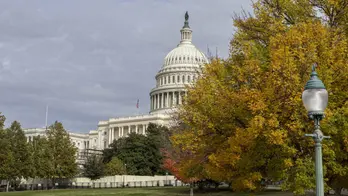Does 'Dry January' actually improve your health? Here's what to know
For health-conscious folks who pay attention to trends, the start of the New Year sometimes means the start of Dry January.
The month-long public health campaign encourages people to abstain from alcohol as a way to improve their health and well-being.
Are there actual health benefits associated with Dry January?
For the most part, experts say yes — though it’s not an absolute must for everyone.
NEW YEAR'S BEST INSIGHTS FOR A HAPPY, HEALTHY AND MORE HOPEFUL LIFE
"Ultimately, sober months like Dry January can be harmless for the majority of the population who do not have a severe alcohol use disorder," said Dr. Deni Carise of Conshohocken, Pennsylvania, former chief science officer at the Recovery Centers of America.
"Diagnoses are characterized as mild, moderate or severe," Carise continued. "Those who drink heavily could encounter very serious health risks when quitting abruptly and should take caution."

Dry January is a month-long public health campaign that encourages people to stay sober and alcohol-free. "I’ve been doing it for years. It is a great chance to hit the reset button," one individual told Fox News Digital. (iStock)
"I’ve been doing it for years. It is a great chance to hit the reset button after so many holiday parties from Thanksgiving and Christmas through New Year’s Eve," John Hayes, a financial broker in Atlanta, Georgia, told Fox News Digital last year about Dry January.
"Feels like a million bucks. Big advocate," he added.
DOES ‘DRY JANUARY’ ACTUALLY IMPROVE YOUR LIFE?
There is research showing that a month without alcohol leads to lower blood pressure, cholesterol and diabetes risk, as well as lower cancer-related proteins in the blood.
"It isn’t about giving anything up. It is about getting something back. Get your fun back. Get your energy back. Get your calm back," the group Alcohol Change UK stated on its website. It's the association behind the "Dry January" campaign and provides an app as well as several tools to help support those who undergo the New Year’s challenge.
If you’re thinking of participating in Dry January this year, there are health considerations you should know before you ditch alcohol for an entire month.
Alcohol’s impact on physical health
Aside from saving money from all the alcoholic beverages you won’t be purchasing for the month of January, the top health benefit you’ll receive is avoiding unnecessary calories.

A federal committee tightened recommendations on alcohol intake to one drink each day for men. The advice would remain unchanged for women, at one drink daily. (iStock)
A can of beer is around 154 calories, while a five-ounce serving of wine is around 123 calories, according to the USDA's FoodData Central database.
Varying spirits and liquors like sake, whiskey, vodka, rum and gin tend to be under 100 calories, but that’s on a per-ounce basis.
'DRY JANUARY' CAN WORK, YES, BUT BEWARE A 'BOOZY DECEMBER': EXPERTS
These totals can ratchet up quickly when people drink cocktails.
Calorie intake estimates published by the FDA state that men and women above the age of 21 can potentially consume 2,400 to 3,000 calories and 2,000 to 2,400 calories per day, respectively, depending on how active their lifestyles are.
Avoiding alcohol could potentially improve your digestive system.
DRINKING MAY SHRINK THE BRAIN, EVEN IN MODERATE AMOUNTS, STUDIES SAY
Alcohol is considered a diuretic — so it increases the passing of urine, which can a dehydrating effect if you’re not drinking enough water.
A study by The American Journal of Gastroenterology found that "heavy alcohol intake" appears to "exacerbate gastrointestinal symptoms in adults with irritable bowel syndrome," which includes symptoms like abdominal and stomach pain, bloating, intestinal gas, diarrhea, constipation, nausea, heartburn and indigestion.

Drinking alcohol before bed can have negative effects, including sleep interruption and staying up late. (iStock)
Drinking alcohol before bed has also been found to interrupt rapid eye movement (REM) sleep and have insomnia-like effects, according to the National Sleep Foundation, a Washington, D.C.-based nonprofit that provides expert-backed information on sleep.
CLICK HERE TO SIGN UP FOR OUR LIFESTYLE NEWSLETTER
Refraining from alcoholic beverages at night and in general could potentially provide deeper, more consistent sleep, which might, in turn, offer more energy throughout the day, the nonprofit reports.
Alcohol’s impact on mental health
Abstaining from alcohol can have positive effects on your mental health, according to Dr. Daryl Appleton, a psychotherapist who practices in NYC and New England.
"A lot of my clients engage in a Dry January as a mental and emotional detox and ritual in self-control," said Appleton. "Depending on whom the person is, what their history contains and their intentions around drinking for the rest of the year dictate its impact one's overall health."

Experts say abstaining from alcohol can help improve mental health. (iStock)
She continued, "On the positive side, allowing your body and brain to take a break from alcohol can potentially decrease cortisol and the stress it puts on the system, which allows for rest and repair. Since alcohol is a depressant, taking a break can also uncover if alcohol is masking emotional symptoms as a [bandage] or is contributing to them by making anger, sadness and isolation feel worse."
Sober months like Dry January help people evaluate their relationship with alcohol, she added.
CLICK HERE TO GET THE FOX NEWS APP
"On the not-so-healthy side, if someone has an alcohol use disorder obviously stopping cold can lead to severe withdrawals, seizures and even death," Appleton warned.
"Understanding one’s relationship with alcohol is imperative before deciding to cut it off completely and suddenly."
For more Lifestyle articles, visit www.foxnews.com/lifestyle.
Disclaimer: The copyright of this article belongs to the original author. Reposting this article is solely for the purpose of information dissemination and does not constitute any investment advice. If there is any infringement, please contact us immediately. We will make corrections or deletions as necessary. Thank you.







